Ethical Analysis of Nestle's Supply Chain and Child Labor Practices
VerifiedAdded on 2023/01/12
|7
|879
|48
Case Study
AI Summary
This case study examines the ethical responsibilities of Nestle concerning child labor within its supply chain, specifically focusing on a situation in a Côte d'Ivoire cocoa plantation. The analysis delves into the application of ethical principles, including virtue ethics, consequentialism, and deontology, to evaluate Nestle's moral obligations even when it lacks direct ownership of its suppliers. The study explores issues such as child labor, the impact on children's rights to education and health, and the importance of ethical practices within the supply chain. It highlights Nestle's role in creating value, managing quality, and ensuring ethical conduct. The conclusion addresses whether Nestle is morally accountable for the actions within its supply chain, providing a comprehensive evaluation based on the ethical frameworks presented. The assignment also includes a table of contents, an introduction to ethics, and a detailed review of the relevant literature.
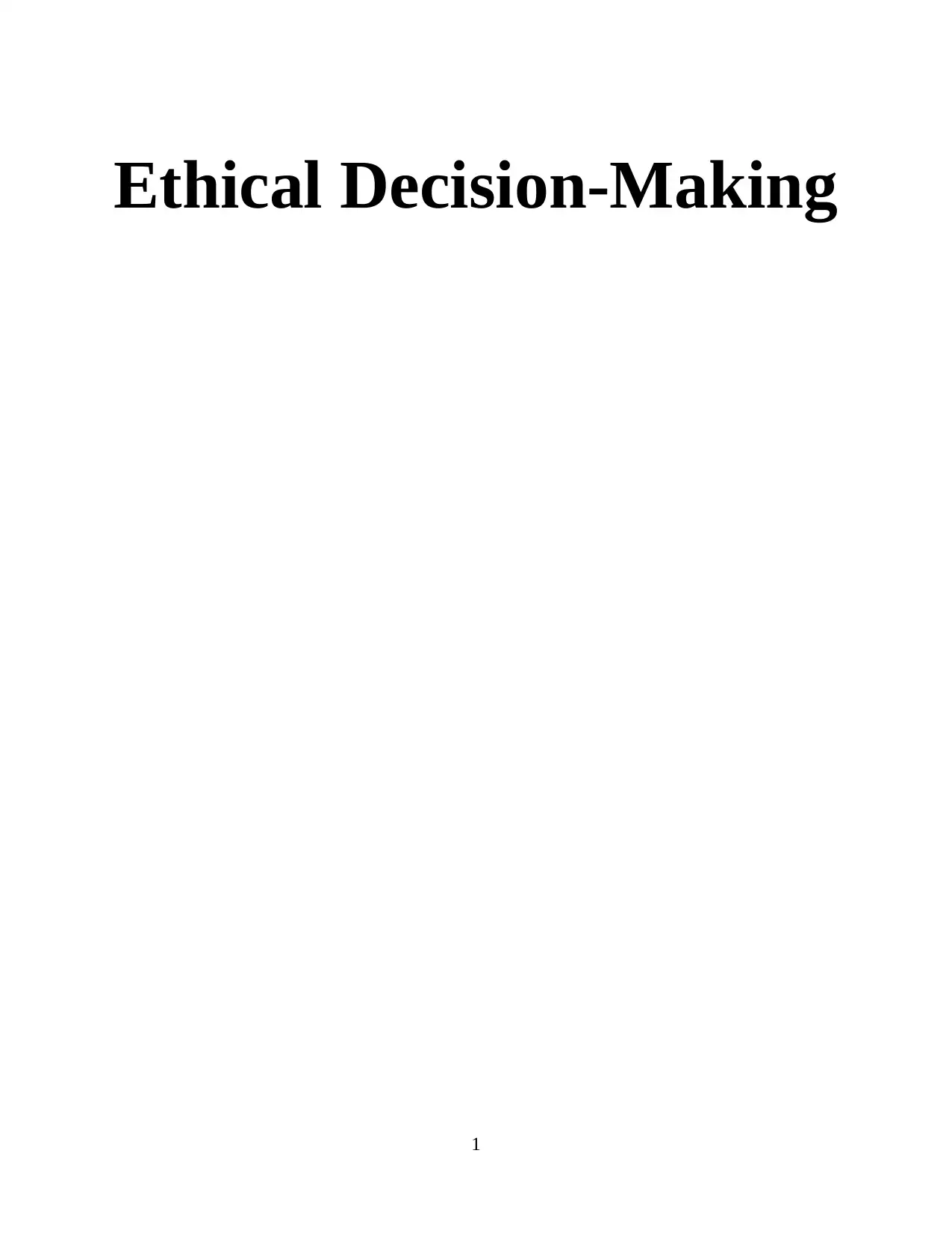
Ethical Decision-Making
1
1
Paraphrase This Document
Need a fresh take? Get an instant paraphrase of this document with our AI Paraphraser
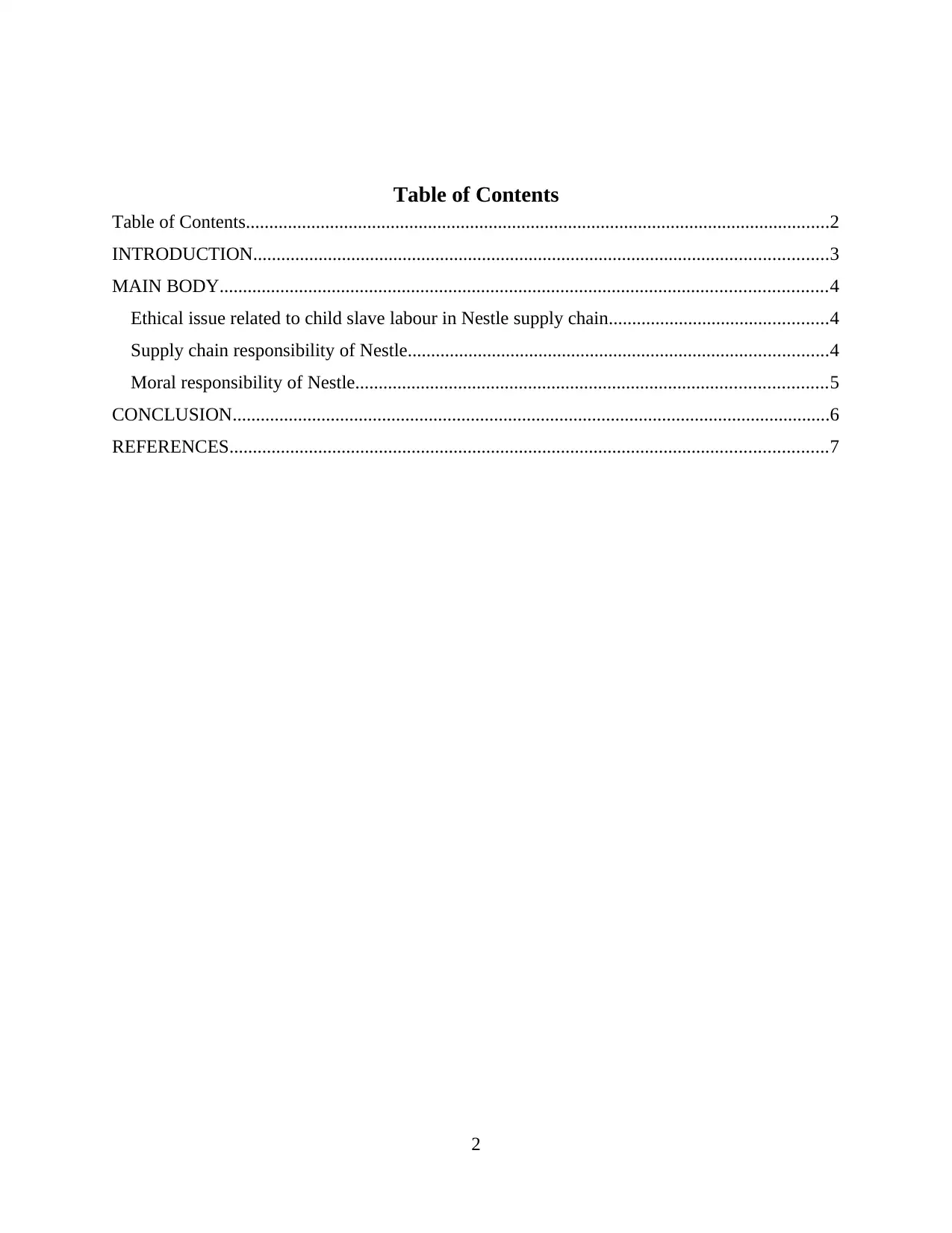
Table of Contents
Table of Contents.............................................................................................................................2
INTRODUCTION...........................................................................................................................3
MAIN BODY..................................................................................................................................4
Ethical issue related to child slave labour in Nestle supply chain...............................................4
Supply chain responsibility of Nestle..........................................................................................4
Moral responsibility of Nestle.....................................................................................................5
CONCLUSION................................................................................................................................6
REFERENCES................................................................................................................................7
2
Table of Contents.............................................................................................................................2
INTRODUCTION...........................................................................................................................3
MAIN BODY..................................................................................................................................4
Ethical issue related to child slave labour in Nestle supply chain...............................................4
Supply chain responsibility of Nestle..........................................................................................4
Moral responsibility of Nestle.....................................................................................................5
CONCLUSION................................................................................................................................6
REFERENCES................................................................................................................................7
2
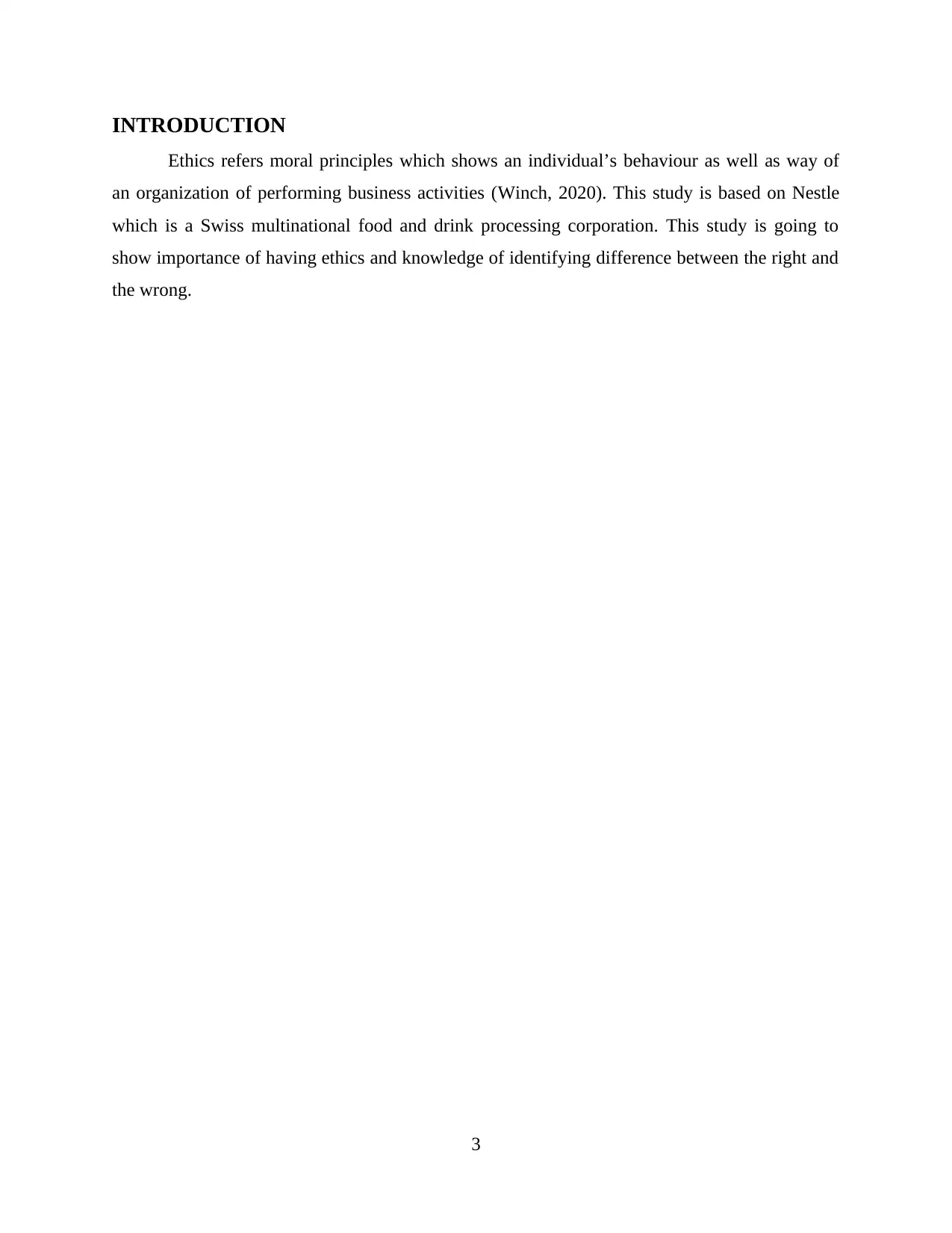
INTRODUCTION
Ethics refers moral principles which shows an individual’s behaviour as well as way of
an organization of performing business activities (Winch, 2020). This study is based on Nestle
which is a Swiss multinational food and drink processing corporation. This study is going to
show importance of having ethics and knowledge of identifying difference between the right and
the wrong.
3
Ethics refers moral principles which shows an individual’s behaviour as well as way of
an organization of performing business activities (Winch, 2020). This study is based on Nestle
which is a Swiss multinational food and drink processing corporation. This study is going to
show importance of having ethics and knowledge of identifying difference between the right and
the wrong.
3
⊘ This is a preview!⊘
Do you want full access?
Subscribe today to unlock all pages.

Trusted by 1+ million students worldwide
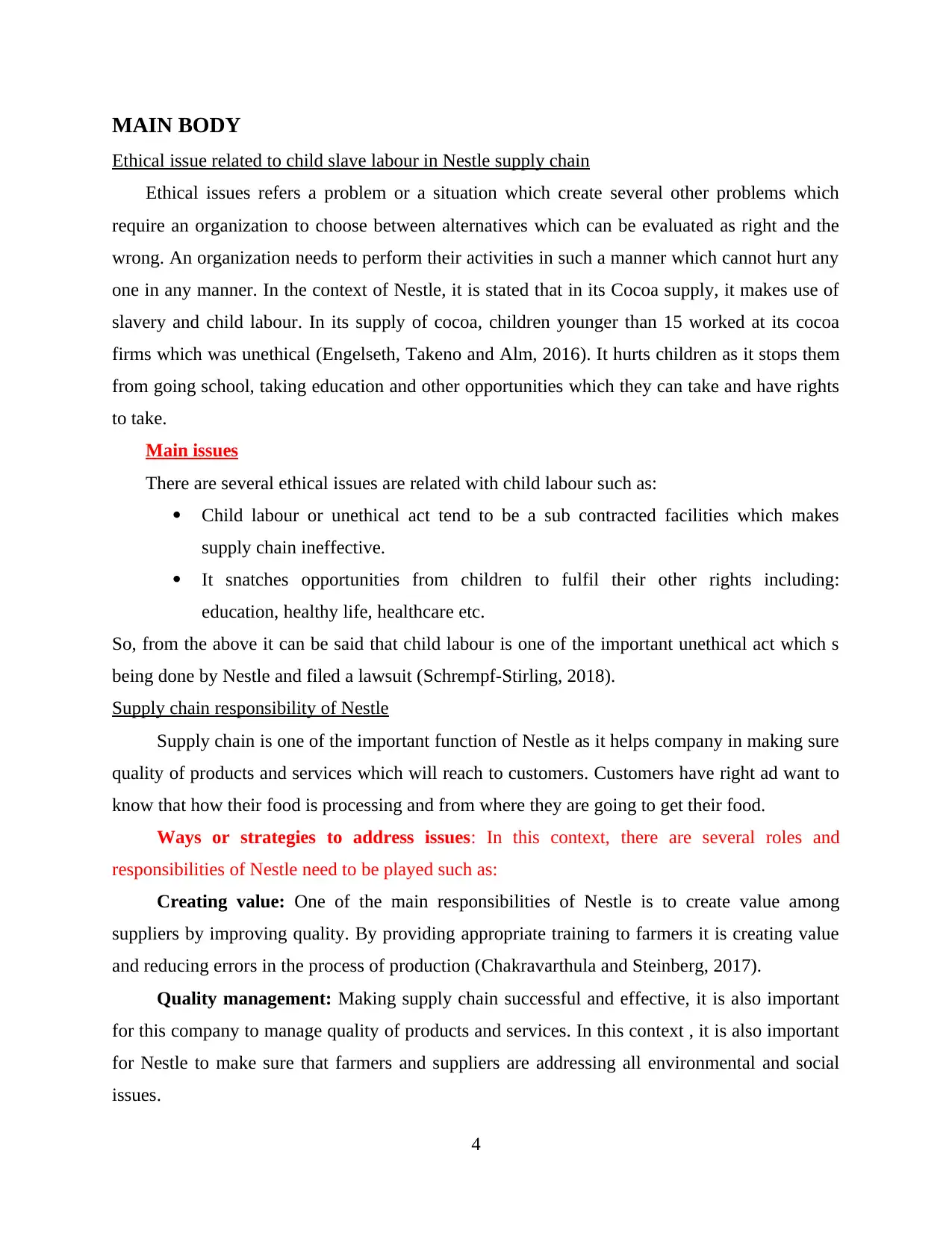
MAIN BODY
Ethical issue related to child slave labour in Nestle supply chain
Ethical issues refers a problem or a situation which create several other problems which
require an organization to choose between alternatives which can be evaluated as right and the
wrong. An organization needs to perform their activities in such a manner which cannot hurt any
one in any manner. In the context of Nestle, it is stated that in its Cocoa supply, it makes use of
slavery and child labour. In its supply of cocoa, children younger than 15 worked at its cocoa
firms which was unethical (Engelseth, Takeno and Alm, 2016). It hurts children as it stops them
from going school, taking education and other opportunities which they can take and have rights
to take.
Main issues
There are several ethical issues are related with child labour such as:
Child labour or unethical act tend to be a sub contracted facilities which makes
supply chain ineffective.
It snatches opportunities from children to fulfil their other rights including:
education, healthy life, healthcare etc.
So, from the above it can be said that child labour is one of the important unethical act which s
being done by Nestle and filed a lawsuit (Schrempf-Stirling, 2018).
Supply chain responsibility of Nestle
Supply chain is one of the important function of Nestle as it helps company in making sure
quality of products and services which will reach to customers. Customers have right ad want to
know that how their food is processing and from where they are going to get their food.
Ways or strategies to address issues: In this context, there are several roles and
responsibilities of Nestle need to be played such as:
Creating value: One of the main responsibilities of Nestle is to create value among
suppliers by improving quality. By providing appropriate training to farmers it is creating value
and reducing errors in the process of production (Chakravarthula and Steinberg, 2017).
Quality management: Making supply chain successful and effective, it is also important
for this company to manage quality of products and services. In this context , it is also important
for Nestle to make sure that farmers and suppliers are addressing all environmental and social
issues.
4
Ethical issue related to child slave labour in Nestle supply chain
Ethical issues refers a problem or a situation which create several other problems which
require an organization to choose between alternatives which can be evaluated as right and the
wrong. An organization needs to perform their activities in such a manner which cannot hurt any
one in any manner. In the context of Nestle, it is stated that in its Cocoa supply, it makes use of
slavery and child labour. In its supply of cocoa, children younger than 15 worked at its cocoa
firms which was unethical (Engelseth, Takeno and Alm, 2016). It hurts children as it stops them
from going school, taking education and other opportunities which they can take and have rights
to take.
Main issues
There are several ethical issues are related with child labour such as:
Child labour or unethical act tend to be a sub contracted facilities which makes
supply chain ineffective.
It snatches opportunities from children to fulfil their other rights including:
education, healthy life, healthcare etc.
So, from the above it can be said that child labour is one of the important unethical act which s
being done by Nestle and filed a lawsuit (Schrempf-Stirling, 2018).
Supply chain responsibility of Nestle
Supply chain is one of the important function of Nestle as it helps company in making sure
quality of products and services which will reach to customers. Customers have right ad want to
know that how their food is processing and from where they are going to get their food.
Ways or strategies to address issues: In this context, there are several roles and
responsibilities of Nestle need to be played such as:
Creating value: One of the main responsibilities of Nestle is to create value among
suppliers by improving quality. By providing appropriate training to farmers it is creating value
and reducing errors in the process of production (Chakravarthula and Steinberg, 2017).
Quality management: Making supply chain successful and effective, it is also important
for this company to manage quality of products and services. In this context , it is also important
for Nestle to make sure that farmers and suppliers are addressing all environmental and social
issues.
4
Paraphrase This Document
Need a fresh take? Get an instant paraphrase of this document with our AI Paraphraser
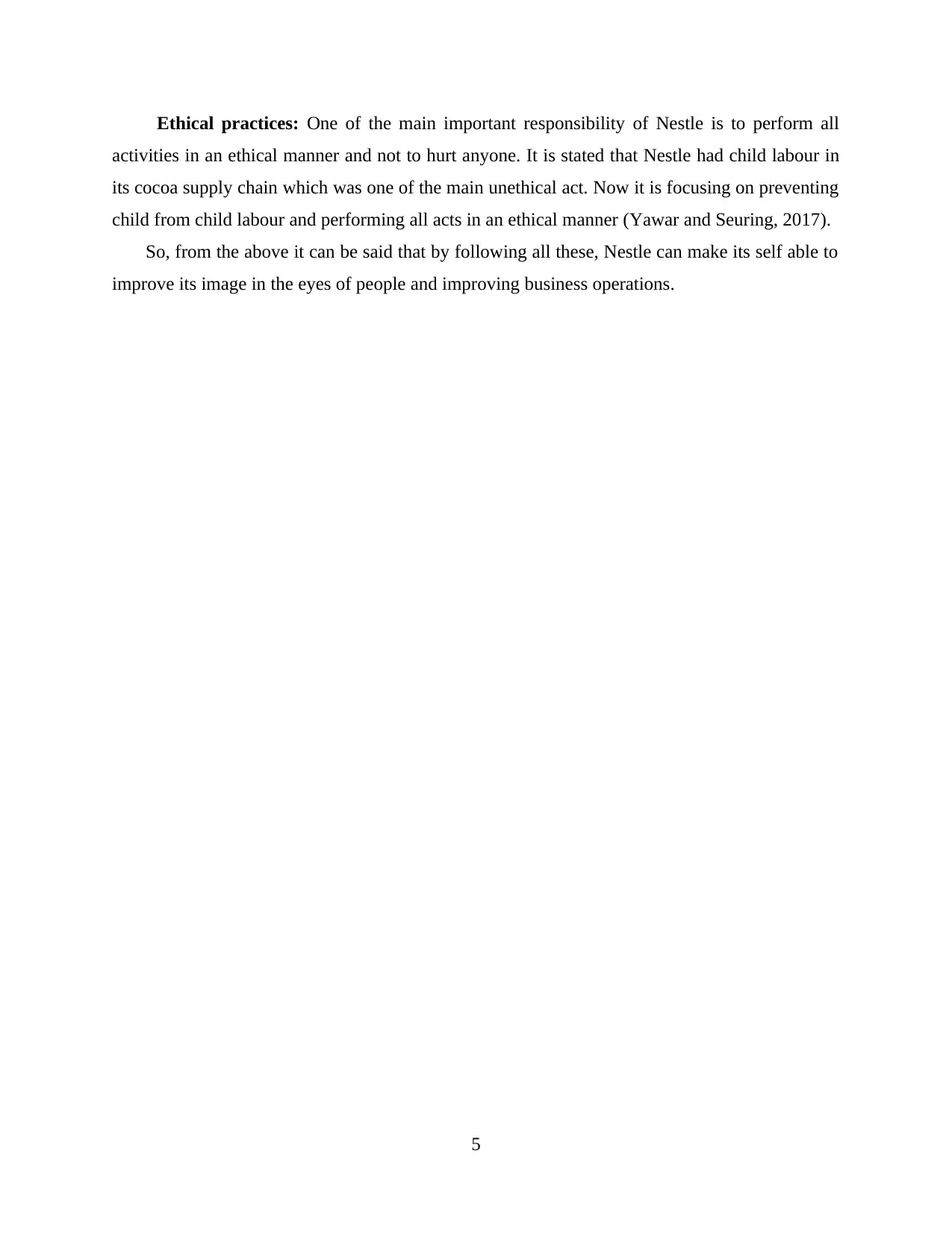
Ethical practices: One of the main important responsibility of Nestle is to perform all
activities in an ethical manner and not to hurt anyone. It is stated that Nestle had child labour in
its cocoa supply chain which was one of the main unethical act. Now it is focusing on preventing
child from child labour and performing all acts in an ethical manner (Yawar and Seuring, 2017).
So, from the above it can be said that by following all these, Nestle can make its self able to
improve its image in the eyes of people and improving business operations.
5
activities in an ethical manner and not to hurt anyone. It is stated that Nestle had child labour in
its cocoa supply chain which was one of the main unethical act. Now it is focusing on preventing
child from child labour and performing all acts in an ethical manner (Yawar and Seuring, 2017).
So, from the above it can be said that by following all these, Nestle can make its self able to
improve its image in the eyes of people and improving business operations.
5
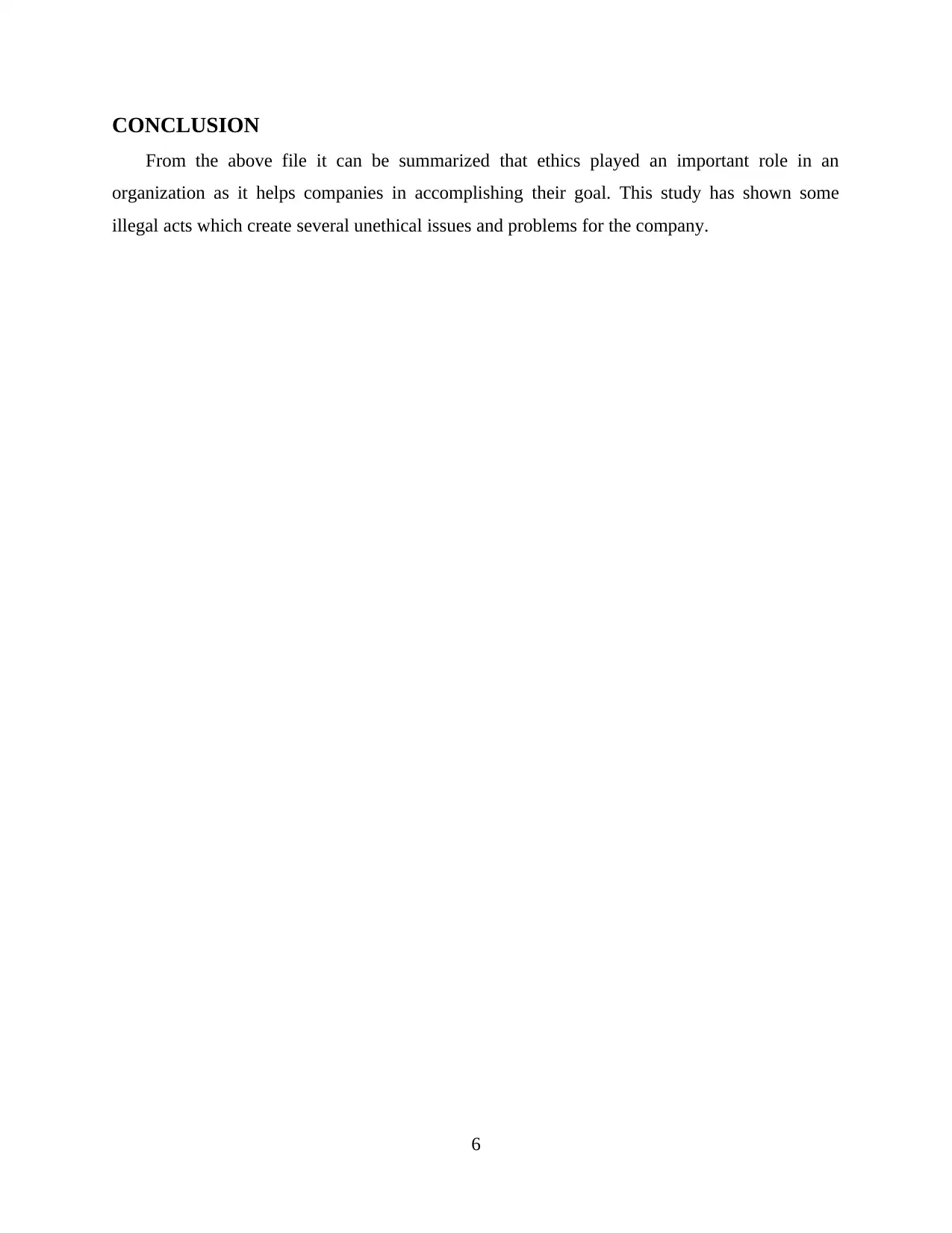
CONCLUSION
From the above file it can be summarized that ethics played an important role in an
organization as it helps companies in accomplishing their goal. This study has shown some
illegal acts which create several unethical issues and problems for the company.
6
From the above file it can be summarized that ethics played an important role in an
organization as it helps companies in accomplishing their goal. This study has shown some
illegal acts which create several unethical issues and problems for the company.
6
⊘ This is a preview!⊘
Do you want full access?
Subscribe today to unlock all pages.

Trusted by 1+ million students worldwide
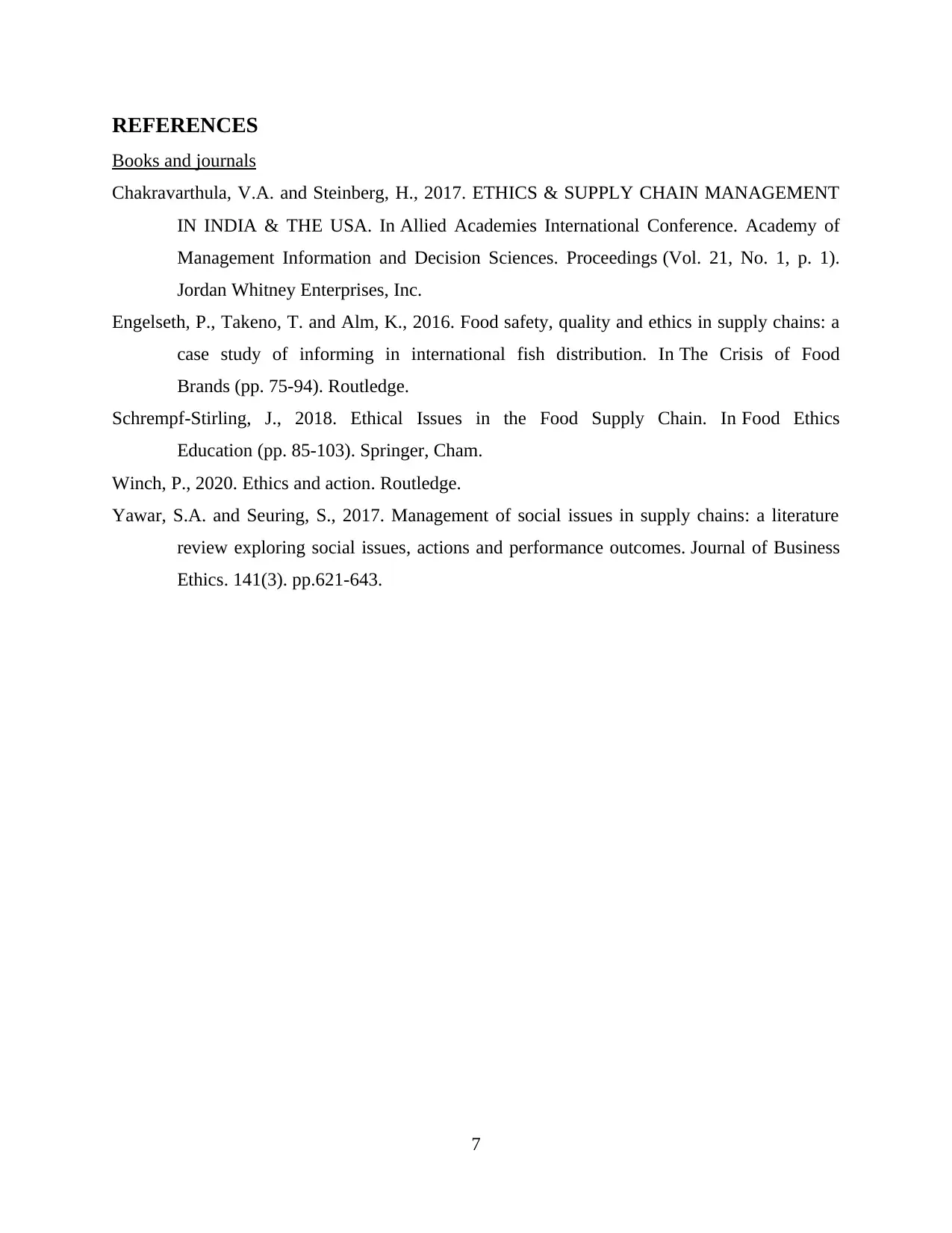
REFERENCES
Books and journals
Chakravarthula, V.A. and Steinberg, H., 2017. ETHICS & SUPPLY CHAIN MANAGEMENT
IN INDIA & THE USA. In Allied Academies International Conference. Academy of
Management Information and Decision Sciences. Proceedings (Vol. 21, No. 1, p. 1).
Jordan Whitney Enterprises, Inc.
Engelseth, P., Takeno, T. and Alm, K., 2016. Food safety, quality and ethics in supply chains: a
case study of informing in international fish distribution. In The Crisis of Food
Brands (pp. 75-94). Routledge.
Schrempf-Stirling, J., 2018. Ethical Issues in the Food Supply Chain. In Food Ethics
Education (pp. 85-103). Springer, Cham.
Winch, P., 2020. Ethics and action. Routledge.
Yawar, S.A. and Seuring, S., 2017. Management of social issues in supply chains: a literature
review exploring social issues, actions and performance outcomes. Journal of Business
Ethics. 141(3). pp.621-643.
7
Books and journals
Chakravarthula, V.A. and Steinberg, H., 2017. ETHICS & SUPPLY CHAIN MANAGEMENT
IN INDIA & THE USA. In Allied Academies International Conference. Academy of
Management Information and Decision Sciences. Proceedings (Vol. 21, No. 1, p. 1).
Jordan Whitney Enterprises, Inc.
Engelseth, P., Takeno, T. and Alm, K., 2016. Food safety, quality and ethics in supply chains: a
case study of informing in international fish distribution. In The Crisis of Food
Brands (pp. 75-94). Routledge.
Schrempf-Stirling, J., 2018. Ethical Issues in the Food Supply Chain. In Food Ethics
Education (pp. 85-103). Springer, Cham.
Winch, P., 2020. Ethics and action. Routledge.
Yawar, S.A. and Seuring, S., 2017. Management of social issues in supply chains: a literature
review exploring social issues, actions and performance outcomes. Journal of Business
Ethics. 141(3). pp.621-643.
7
1 out of 7
Related Documents
Your All-in-One AI-Powered Toolkit for Academic Success.
+13062052269
info@desklib.com
Available 24*7 on WhatsApp / Email
![[object Object]](/_next/static/media/star-bottom.7253800d.svg)
Unlock your academic potential
Copyright © 2020–2026 A2Z Services. All Rights Reserved. Developed and managed by ZUCOL.





